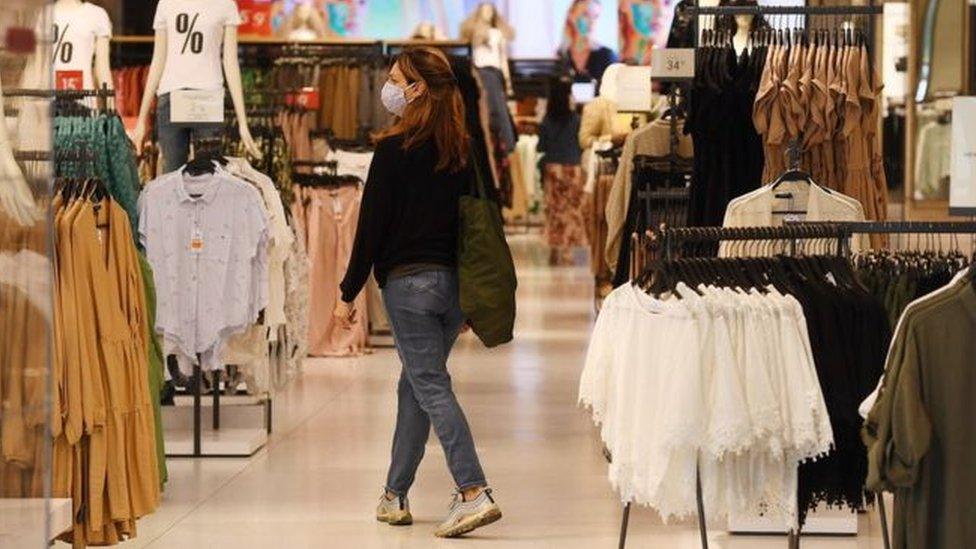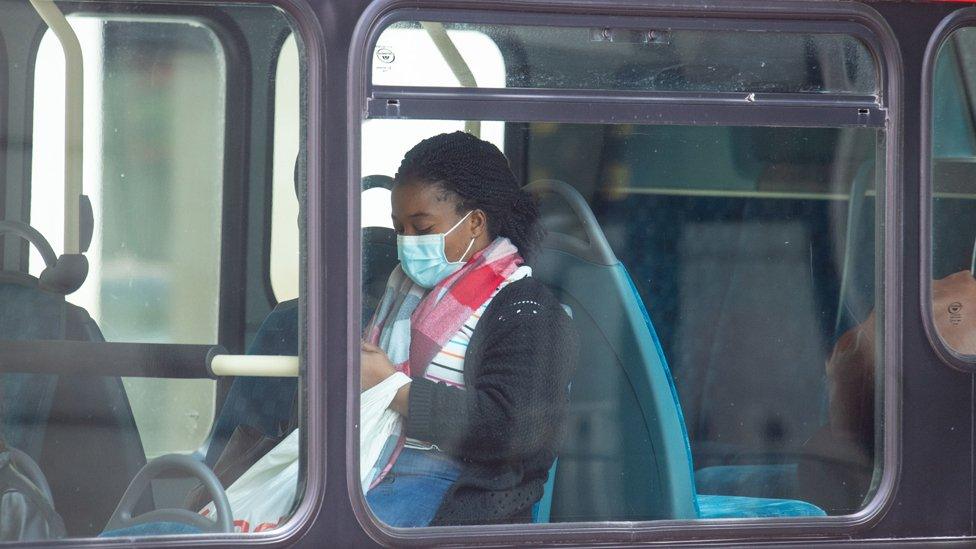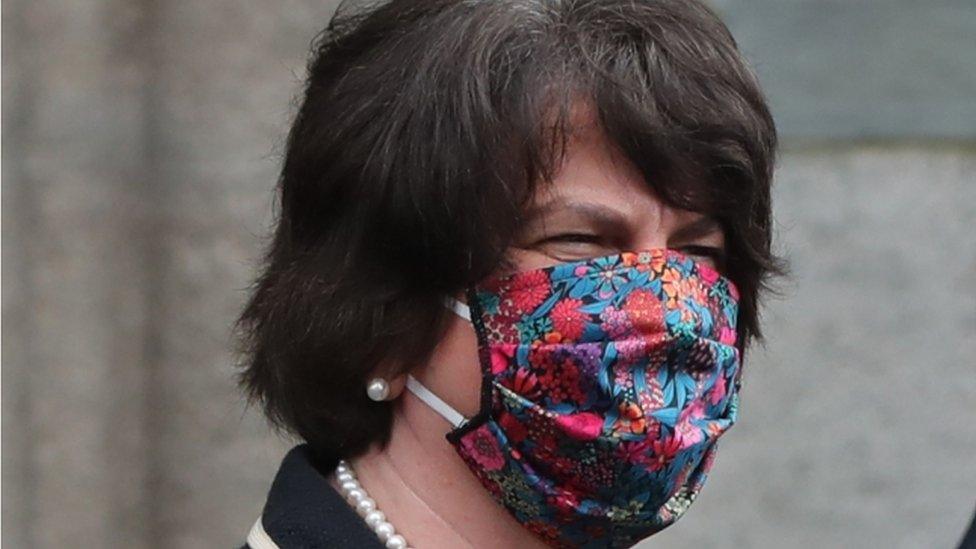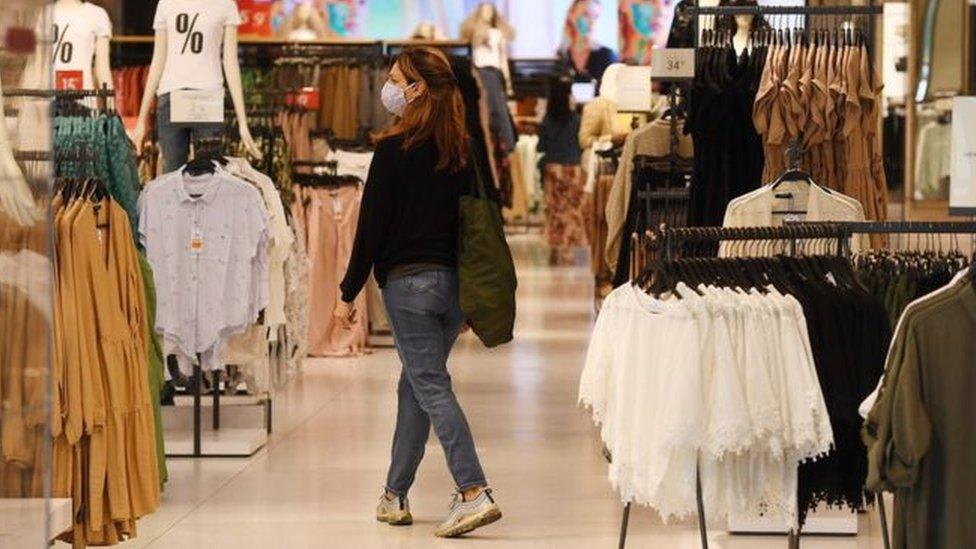Coronavirus: Who will enforce the wearing of face coverings in shops?
- Published

Face coverings in shops are not currently mandatory in Northern Ireland's shops
The Department of Health has said responsibility for imposing a fixed penalty notice for non-compliance of wearing face coverings in shops will "rest with the PSNI".
From Monday 10 August, people can be fined up to £60 for not wearing a face covering in shops.
The Department of Health said the executive expected that people who are able to wear a face covering will do so in order to help protect themselves and others.
Breaches of the requirement could attract a fixed penalty notice of £60 which will be reduced to £30 if paid within 14 days.
The department has said the amount of a fixed penalty notice increases if there are further offences.
"We have a collective duty and a personal responsibility to protect each other," it added.
"Everyone who can wear a face covering should do so.
"It is expected that business will help encourage compliance - to help protect customers and staff.
"Responsibility for imposing a fixed penalty notice for non-compliance will rest with the PSNI."
It is not yet clear how this new legislation will be enforced.
The PSNI has said the primary responsibility for enforcing the wearing of face coverings will lie with shop owners.
It said it would "only use enforcement as a last resort, when all other approaches have been unsuccessful".
However, Aodhán Connolly from the NI Retail Consortium has said retailers could not be responsible for enforcing face covering policy.
First Minister Arlene Foster announced that face coverings in shops and other indoor spaces would become compulsory following a meeting of the NI Executive on Thursday afternoon.
The announcement followed a statement from the Department of Heath that infections have risen three-fold since early July.
How will the regulations affect our everyday lives?
On its website,, external the Department of Health has said that from 10 August the use of face coverings "when you are in a public area indoors, such as in a shop when social distancing is not possible, will be mandatory".
Face coverings must also be worn on public transport.

Face coverings are mandatory on public transport in NI
"The best available scientific evidence is that, when used correctly, wearing a face covering may reduce the spread of coronavirus droplets in certain circumstances, helping to protect others," it added.
The wearing of masks on buses, trains and coaches has been mandatory since 10 July.
Who will enforce the law?
A Belfast shop owner has said it is not her responsibility to enforce the wearing of face coverings in her store and has called on the executive to provide clearer guidance.
Emma McMahon said policing such a policy would be "extremely difficult" and that it is not something she would feel comfortable doing.
"As a business owner, it shouldn't be my responsibility to try and enforce this," Ms McMahon told BBC's Good Morning Ulster programme.
Aodhán Connolly from the NI Retail Consortium said the move was about protecting people and there was a need to remove ambiguity for shoppers.
"We wanted clear and unambiguous guidance. Hopefully, this will give shoppers more confidence returning to the high street."
But Mr Connolly added that retailers could not be responsible for enforcing face covering policy.
"We are looking for that enforcement to be left to the authorities," he said.
So, who is responsible?
The Police Service of Northern Ireland (PSNI) said the primary responsibility for enforcing the wearing of face coverings will lie with the shop owners.
It said: "Where necessary, officers will continue to engage, explain and encourage people to make the right choices and this includes the mandatory wearing of face coverings on public transport, in shops and other public enclosed spaces.
"The primary responsibility for ensuring compliance lies with transport operators and businesses but where police become involved, we will do so on the basis of the four 'Es' and only use enforcement as a last resort, when all other approaches have been unsuccessful."
While enforcement of face masks on public transport is not specifically "an arrestable offence", the police said they do have other powers of arrest should an individual also commit a crime.

Arlene Foster called on the public to work with the NI Executive to help minimise the spread of coronavirus
First Minister Arlene Foster said the guidance was "about trying to give confidence to people who feel vulnerable and maybe have been shielding".
"We're asking the public of Northern Ireland to work again with us around all of these issues and to listen to what we're asking them to do."

How to wear a face covering
The official advice is that a face covering should:
Cover your nose and mouth while allowing you to breathe comfortably
Fit comfortably but securely against the side of the face
Be secured to the head with ties or ear loops
Be made of a material that you find to be comfortable and breathable, such as cotton
Ideally include at least two layers of fabric (the World Health Organisation recommends three depending on the fabric used)
Unless disposable, it should be able to be washed with other items of laundry according to fabric washing instructions and dried without causing the face covering to be damaged
There is advice about how to make your own face covering available on the UK Government website, external.

Does everyone have to wear a face covering?
The Department of Health website also carries advice for people who are indoors in circumstances where it is not possible to wear a face covering, for example, where they are eating or drinking in a restaurant, pub or café, or are exercising in a gym.
In these circumstances, the department said it was acceptable not to use a face covering, but you should replace it as soon as practicable afterwards and maintain social distancing of at least two metres if you are in an enclosed space undertaking physical exercise.
Other circumstances where it may be difficult for some people to wear face coverings, include:
Physical illness
Where it is distressing for someone to cover their face
Where someone is accompanying a person who relies on lip reading to communicate
The reasons for not wearing a face covering may not always be visible
There is no need to get a letter from a doctor or government to show that you do not need to wear a face covering. If you have a condition which means you cannot wear a face covering you only need to say, if asked, that you cannot wear a face covering because you are exempt.
- Published6 August 2020

- Published4 August 2020
